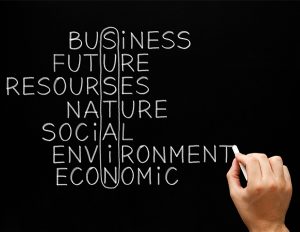 What does “sustainability” mean for businesses? The goal of a sustainable business strategy is to make a positive impact on the environment and on society. A growing number of organizations are integrating sustainability into their business strategy—realizing they can do well by doing good.
What does “sustainability” mean for businesses? The goal of a sustainable business strategy is to make a positive impact on the environment and on society. A growing number of organizations are integrating sustainability into their business strategy—realizing they can do well by doing good.
The mission of the West Coast Chamber Sustainability Affinity Group is improving the social, economic and environmental well-being of our community. The members are committed to preserving the natural capital of our community and sharing the benefits of implementing sustainability practices. Rather than using financial results at the sole measurement for a business’ success, companies investing in sustainability are grading themselves with a three – pronged measurement often known as the “triple bottom line,” or People, Planet, Profit.
While measuring sales, profit and taxes are obvious metrics for judging financial progress, determining how to measure changes on social issues can be more challenging. Social bottom lines can be measured by things such as labor practices, human rights, product responsibility and community impact. REI is an example of a company that offers “Fair Trade Certified” products, which is a practice that continues to build loyal customers. Companies can also measure themselves on the number of volunteer hours provided by their employees and donations made to non-profit organizations as data points for social impact.
When judging a company’s environmental footprint, metrics like greenhouse gas emissions, water usage, energy and waste practices are measured. For example, Nike has committed to 100% renewable energy, which not only helps with climate change but also reduces their operational costs. This corporate giant also tracks its suppliers on a range of metrics, including quality, timeliness, cost—and sustainability. If a supplier wants to continue to work in the Nike supply chain, they better prioritize hitting sustainability marks. To reduce emissions and improve other environmental metrics in its food chain, Wal-Mart tracks not only global greenhouse gas (GHG) output, but also yield, water use, and other factors per ton of food produced.
Beyond helping curb global challenges, sustainability can drive business success. Research shows that a growing number of green-friendly companies, from diverse industries are outperforming their counterparts financially, while also building support of customers. These companies are also setting standards that are making their suppliers, customers and stakeholders take note. Sustainability has emerged as a key corporate ethics conversation, and groups such as the West Coast Chamber Sustainability Affinity Group are poised to help individuals and organizations explore how to implement changes to move the needle on creating a sustainable community and planet for all of us.
Ready to get started on your sustainability strategy? Join us!
Good for Michigan Initiative
June 18, 2019
Good For Michigan is an initiative that convenes and celebrates companies across the state who are demonstrating positive, measurable impacts on their communities and the natural environment. This program provides a wealth of tools and resources which can be used to facilitate effective triple bottom line frameworks within the business community.
Alice Jasper, Sustainable Business Program Manager of Good For Michigan, will share how this initiative uses the Quick Impact Assessment tool to assist companies with measuring the social, environmental and economic impacts of their current practices and identifying opportunities and resources for enhancing those impacts moving forward.
West Coast Chamber Affinity Groups are designed to provide education and networking opportunities for businesses and individuals looking to meet around specific topics, professions and industries. For more information on Affinty Groups, visit the Affinty Group page.
